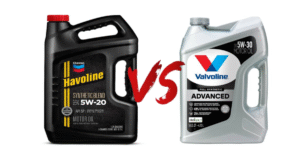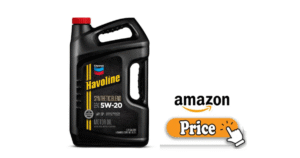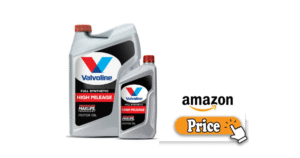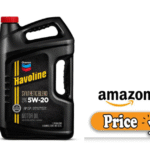When it comes to protecting your engine and enhancing vehicle performance, choosing the right motor oil is critical. If you’ve ever stood in an auto parts store or scrolled through Amazon trying to decide between Havoline and Valvoline, you’re not alone.
I’ve been in your shoes, scratching my head, reading user reviews, watching YouTube comparisons, and ultimately trying both brands in my car. This article is the result of firsthand experience, extensive research, and multiple oil changes with both Havoline and Valvoline. I’ll break down the differences, pros, cons, design features, performance aspects, and how each brand has held up over time in real-world use.
This article is the result of firsthand experience, extensive research, and multiple oil changes with both Havoline and Valvoline. I’ll break down the differences, pros, cons, design features, performance aspects, and how each brand has held up over time in real-world use.
Whether you’re a weekend warrior, a daily commuter, or just someone who wants the best value for your engine, this is the only comparison you’ll need. Let’s dive in!
What I Like
Havoline
- Advanced Deposit Shield® Technology: Havoline’s standout feature is its proprietary deposit shield, which keeps your engine clean and free of gunk. It works after a few months; my oil was still a deep amber rather than a thick black.
- Affordable Price Point: Havoline gives you a lot of bang for your buck, especially if you’re budget-conscious but still want high performance.
- Smooth Idle and Quiet Operation: My engine sounded smoother at idle compared to other, less expensive oils.
- Good Fuel Economy: Slight but noticeable bump in MPG during highway driving.
Valvoline
- Trusted, Legacy Brand: Valvoline has been around since 1866. Something is reassuring about that. Some OEMs even recommend it.
- Full Synthetic and High-Mileage Options: Valvoline offers top-tier synthetic oils like Valvoline Advanced Full Synthetic and Valvoline High Mileage MaxLife, which I used in my 10-year-old Honda Accord.
- Excellent Cold Start Protection: I live in a climate that gets cold in winter, and my car started up effortlessly every time using Valvoline.
- Longer Oil Change Intervals: Valvoline held up better over time and could stretch to 7,500 miles without issue.

👉🏿👉🏻 Check Latest Price and Offer at Amazon 👈🏻👈🏿
What Could Be Better
Havoline
- Limited High-Mileage Formulas: While Havoline performs well, I noticed they don’t cater as broadly to high-mileage or specialized vehicle types as Valvoline does.
- Less Availability in Retail Stores: Depending on where you live, it might be harder to find Havoline at your local auto shop. I had to order it online.
Valvoline
- More Expensive: Valvoline’s premium options come at a cost. If you’re maintaining multiple vehicles, the price difference adds up.
- Slightly Thicker at Startup: In colder temps, Valvoline seemed a touch thicker than Havoline initially, though this didn’t affect performance significantly.

👉🏿👉🏻 Check Latest Price and Offer at Amazon 👈🏻👈🏿
My Personal Experience
I own two vehicles, a 2015 Toyota Camry and a 2011 Honda Accord, both with over 100,000 miles. I used Havoline in the Camry and Valvoline High Mileage in the Accord.
Using Havoline
The Camry ran smoother right after the oil change. I noticed less engine noise, even after long drives. I usually change my oil every 5,000 miles, and the oil condition was still excellent by the time I swapped it out.
Using Valvoline
Valvoline shone in the Accord. Given its age, I was worried about leaks or sludge. Valvoline High Mileage not only prevented any oil seepage but also reduced oil consumption, something older cars often struggle with. Plus, the engine performance stayed consistent for nearly 8,000 miles.
Both brands delivered in their own way, but depending on your vehicle age, driving style, and maintenance schedule, one may suit you better than the other.
Design
Both Havoline and Valvoline offer innovative packaging, but there are some subtle differences worth mentioning.
Havoline Smart Change® Packaging
- Eco-friendly cardboard outer packaging
- Easy-pour spout reduces spills.
- Stackable and space-saving
- Less plastic waste is a win for the environment
This is where Havoline impressed me. The Smart Change box is genius for DIY oil changers like me. No more glug-glug spills!
Valvoline EZ Pour™ Bottle
- Ergonomic design
- Anti-glug feature
- Easy-grip handle
Valvoline’s bottle design is solid. It makes pouring straightforward and mess-free. Though not as environmentally progressive as Havoline’s Smart Change, it feels durable and professional.
Performance
This is where the rubber meets the road literally. Let’s break down the performance of Havoline vs Valvoline under different conditions.
| Criteria | Havoline | Valvoline |
| Cold Starts | Good | Excellent |
| Long-Distance Driving | Smooth, with consistent viscosity | Great, with stable temperature control |
| Oil Longevity | 5,000–6,000 miles comfortably | Up to 7,500 miles or more |
| Fuel Efficiency | Slight improvement | Moderate improvement |
| Engine Cleanliness | Excellent (Deposit Shield tech) | Excellent (Detergent-rich formula) |
If you’re doing mostly city driving, Havoline is great. For highway driving or extended oil intervals, Valvoline may give you more longevity and thermal stability.
Build Quality
Yes, even oil has built quality, in terms of formulation and additive packages.
Havoline
- Includes Deposit Shield Technology
- Meets API SP, ILSAC GF-6A standards
- Fights sludge and deposits efficiently
Valvoline
- Includes Extra Wear Protection Additives
- Meets API SP, Dexos1 Gen 2, ILSAC GF-6
- Designed for turbocharged engines and GDI systems
Valvoline seems to have a broader approach to modern engine protection, especially with turbocharged and direct injection engines. Havoline isn’t far behind, but Valvoline’s long history shows in the refined nature of their formulations.
Alternative Option
If you’re not sold on Havoline or Valvoline, here are two excellent alternatives:
Mobil 1
- Premium full synthetic
- Great for high-performance engines
- Trusted by automakers
Castrol EDGE
- Titanium-based additive technology
- Excellent under extreme pressure
- Popular in European vehicles
Both brands offer high-end performance oils, though at a higher cost. If you want maximum performance, they’re worth considering.
Read More: Quaker State vs Mobil 1: A Comprehensive Comparison Guide
Final Thought
So, Havoline vs Valvoline, who wins?
The answer is both, depending on your needs:
- Choose Havoline if you’re looking for affordability, eco-friendly packaging, and consistent daily driving performance.
- Choose Valvoline if you want maximum protection, longer oil change intervals, and high-mileage reliability.
My Verdict:
For newer vehicles and regular intervals, I’d go with Havoline. For older cars, longer intervals, or harsh driving conditions, Valvoline High Mileage is hard to beat.
Ultimately, your driving habits, climate, and vehicle condition will determine which oil performs best for you.
FAQs:
1. Can I switch between Havoline and Valvoline?
Yes, as long as the oil meets your car’s required viscosity and certification (e.g., SAE 5W-30, API SP), it’s safe to switch.
2. Which oil is better for high-mileage cars?
Valvoline High Mileage is specifically formulated for engines over 75,000 miles and contains seal conditioners to reduce leaks.
3. Does Havoline clean your engine better?
Havoline’s Deposit Shield® does an excellent job of preventing and cleaning sludge buildup, especially with regular changes.
4. Which brand lasts longer between oil changes?
Valvoline typically has longer drain intervals, especially in synthetic formulations.
5. Is synthetic oil better than conventional oil for both brands?
Yes, synthetic offers better high-temperature stability and lower volatility. Both Havoline and Valvoline excel in their synthetic options.
Focus Keyword Recap: Havoline vs Valvoline | My Honest Experience
We’ve covered everything from performance and packaging to long-term experience and real-world reliability. If you’re still debating Havoline vs Valvoline, I hope this honest breakdown gave you the clarity you need.
Whatever you choose, treat your engine right. It deserves it.





